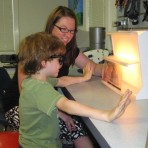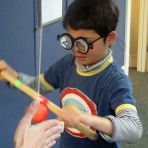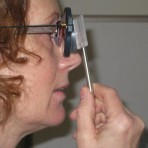A friend recommended that we see Dr. Ruggiero, who diagnosed [my daughter] with tracking issues and a lack of eye teaming. We began vision therapy in January, and after six months, my daughter was reading fluently – so much so that she read the entire Harry Potter series that summer!
Vision therapy changes lives.
 Many visual problems cannot be addressed with eyeglasses alone. In fact, even individuals with 20/20 eyesight can suffer from visual problems that significantly impact their overall quality of life.
Many visual problems cannot be addressed with eyeglasses alone. In fact, even individuals with 20/20 eyesight can suffer from visual problems that significantly impact their overall quality of life.
Optometric vision therapy has been proven to be a highly effective treatment for patients who need to develop or improve their visual skills, change how they process and interpret visual information, correct or compensate for vision problems that have suddenly developed, or to resolve vision problems responsible for learning disabilities, fatigue, recurring headaches, poor hand-eye coordination and other vision-related symptoms.
Vision therapy is frequently prescribed to treat:
- Accommodative disorders – focusing problems
- Ocular-motor dysfunction – eye movement disorders
- Vergence dysfunction– inefficiency in using both eyes together as a team
- Strabismus– an eye that turns in or out
- Amblyopia– lazy eye
- Visual information processing disorders
- Visual sensory and motor integration
How Vision Therapy Works
 Vision therapy is based in neuroplasticity, or the brain’s innate ability to form new neural connections and synapses throughout a person’s lifetime. In the case of vision therapy, the primary goal is to use this neuroplasticity to develop new visual neuromuscular pathways. After all, vision occurs neither in the eyes, nor in the brain, but emerges from the collaboration of the eyes and the rest of the brain. Vision develops and, due to neural plasticity, can be enhanced through vision therapy.
Vision therapy is based in neuroplasticity, or the brain’s innate ability to form new neural connections and synapses throughout a person’s lifetime. In the case of vision therapy, the primary goal is to use this neuroplasticity to develop new visual neuromuscular pathways. After all, vision occurs neither in the eyes, nor in the brain, but emerges from the collaboration of the eyes and the rest of the brain. Vision develops and, due to neural plasticity, can be enhanced through vision therapy.
The Prevalence and Implications of Vision Disorders
 The American Optometric Association estimates that approximately 25 percent of people have vision problems that can’t be treated with corrective lenses alone. This statistic stems from the fact that while almost all individuals are born with the potential for good eyesight, vision is a learned skill that is developed over time. In instances where vision isn’t developed completely, individuals might have trouble identifying, interpreting or understanding what they see. They might also have trouble using their eyes together efficiently. In children, this can lead to incorrect diagnoses of learning and attention disorders. In adults, it can cause serious lifestyle and career challenges.
The American Optometric Association estimates that approximately 25 percent of people have vision problems that can’t be treated with corrective lenses alone. This statistic stems from the fact that while almost all individuals are born with the potential for good eyesight, vision is a learned skill that is developed over time. In instances where vision isn’t developed completely, individuals might have trouble identifying, interpreting or understanding what they see. They might also have trouble using their eyes together efficiently. In children, this can lead to incorrect diagnoses of learning and attention disorders. In adults, it can cause serious lifestyle and career challenges.
That is where vision therapy comes in.
At Northampton Vision Specialists, our doctors and vision therapists work together to create an individualized treatment plan for every patient participating in a vision therapy program. Treatment, which is comprised of both in-office and home therapy, is generally provided in three-month increments with regular examinations to assess improvements and aide in further treatments. When patients come in for their regular weekly vision therapy appointments, they’ll be taken to our state-of-the-art vision therapy suite, which utilizes therapeutic lenses, optical filters, eye patches, computer software, vestibular and balance challenges and other visual therapy instruments. Perhaps even more important than these tools, however, is the expertise of our dedicated vision therapists who have improved the quality of life for patients of all ages through their caring, patient-centered approach to vision care.
